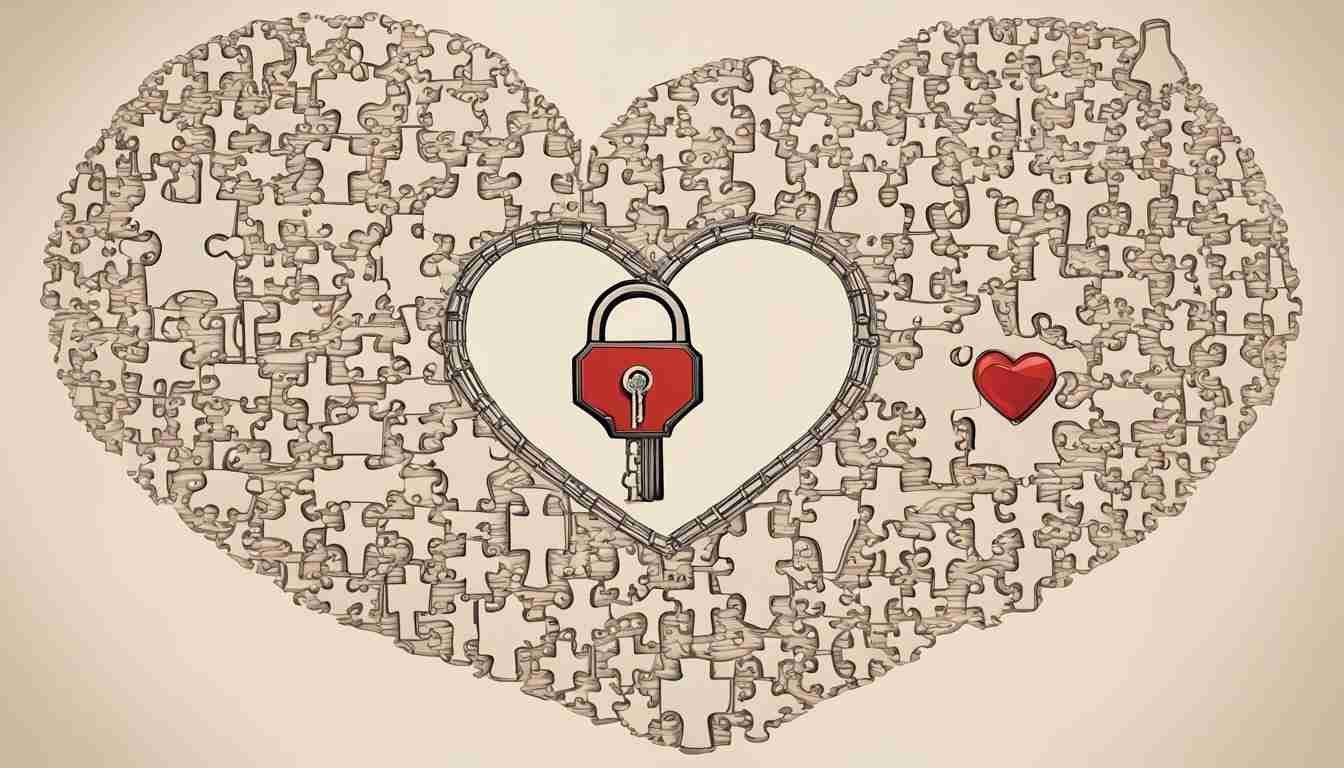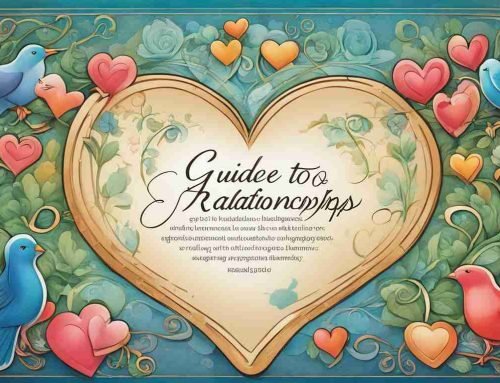Welcome to our article on how to Unlock Love through better understanding in relationships. In today’s fast-paced world, we often forget to give time and effort to our most important relationships, which leads to misunderstandings and miscommunication. However, by implementing some simple tips and strategies, we can improve our relationships and deepen our connection with our partners.
According to research, better understanding in relationships leads to happier and healthier partnerships. It involves effective communication, empathy, conflict resolution, trust building, and problem-solving skills. By focusing on these areas, we can Unlock Love in our relationships and create a more fulfilling life together.
Key Takeaways:
- Improving communication skills is essential for better understanding in relationships.
- Cultivating empathy enhances emotional connection and fosters better understanding.
- Resolving conflicts constructively is crucial to maintaining a healthy relationship.
- Building trust is important for a strong and long-lasting relationship.
- Effective problem-solving skills contribute to a healthy relationship and a happier life together.
- Enhancing emotional intelligence leads to more satisfying relationships.
- Fostering healthy communication patterns promotes mutual respect and understanding.
- Enhancing emotional connection leads to a more fulfilling life together.
Improving Communication Skills
Effective communication is the foundation of any successful relationship. It is essential for expressing thoughts and feelings, negotiating differences, and resolving conflicts. In order to improve communication skills, it is important to:
- Practice active listening: When your partner is speaking, give them your full attention. Avoid interrupting or planning your response before they finish speaking. Reflect on what they have said before responding.
- Be aware of non-verbal cues: Body language, facial expressions, and tone of voice can greatly affect communication. Pay attention to your own non-verbal cues as well as those of your partner.
- Express yourself clearly: Use “I” statements to express your thoughts and feelings. Avoid blame or judgment, and be specific about what you are feeling or needing.
By implementing these strategies, you can improve your communication skills and build a stronger, healthier relationship.
Cultivating Empathy in Relationships
Empathy is a crucial element for building a strong and meaningful relationship with your partner. It is the ability to understand and share their feelings and emotions, while still maintaining your own individuality. When empathy is present, a sense of emotional connection is established, allowing you to communicate and connect on a deeper level.
To start cultivating empathy in your relationship, focus on active listening. This means giving your partner your full attention without interrupting or judging them. Listen to what they are saying, how they are saying it, and what they may be feeling behind their words. By doing so, you will learn to read their non-verbal cues, which are just as important as the words they use.
Another way to cultivate empathy is by imagining yourself in your partner’s shoes. This means putting yourself in their situation and gaining perspective on their feelings and emotions. Ask yourself how you would feel if you were in their position. This will help you understand and connect with them on a deeper level.
Finally, practice expressing your own emotions to your partner. When you are vulnerable and open, it allows your partner to understand you better and become more empathetic towards you. This creates a positive feedback loop, where both partners feel understood and connected.
Resolving Conflicts Constructively
Conflict is inevitable in any relationship, but how you handle it can make all the difference. By learning and practicing effective conflict resolution strategies, you can build a stronger, healthier, and more loving relationship with your partner. Here are some tips for resolving conflicts constructively:
1. Practice Active Listening
One of the most important conflict resolution skills is active listening. This means truly hearing what your partner is saying without interrupting or getting defensive. Repeat back what you heard to ensure that you understood their perspective correctly.
2. Seek Common Ground
When you disagree with your partner, try to find common ground. Focus on the things you both agree on and build from there. By identifying shared goals and values, you can work together to find a solution that works for both of you.
3. Compromise
Compromise is key in any healthy relationship. Neither partner should always have their way; it’s important to make sacrifices and meet each other halfway. Be open to giving and taking in conflicts, and be willing to apologize and make amends when necessary.
4. Seek Professional Help When Necessary
If you and your partner are struggling to resolve conflicts on your own, seek the help of a professional. A couples therapist can provide an objective perspective and offer tools and strategies for improving communication and resolving conflicts in a healthy way.
By implementing these conflict resolution strategies, you can create a safer and more productive space for conversations with your partner. Remember, conflicts are opportunities for growth and learning in your relationship.
Building Trust in Relationships
Trust is a vital component of any successful relationship. It creates a sense of safety, security, and openness that promotes love and emotional connection. Building trust takes time and effort, but it is worth it. Here are some tips for developing trust in your relationship:
1. Open Communication
Clear and honest communication is essential for building trust. When partners feel comfortable expressing their thoughts and feelings, problems can be openly discussed and resolved. Active listening, expressing oneself clearly, and encouraging open dialogue about any concerns or challenges are essential for creating a foundation of trust.
2. Honesty
Honesty is important for building trust in relationships. Being truthful and transparent with one another, even when it is difficult, strengthens communication and fosters emotional connection. When trust is broken, it takes a considerable effort to regain it, and it is not always guaranteed. So it is essential to be honest and truthful from the outset.
3. Reliability
Reliability is an important aspect of building trust. By following through on commitments, it demonstrates that you are a trustworthy and dependable partner. When promises are kept, it shows that you value your partner and their feelings. Unreliability, inconsistency or failing to follow through on commitments can erode trust and lead to relationship issues.
4. Respecting Boundaries
Respect is paramount for building trust in a relationship. Both partners should have the right to set boundaries that must be respected. When boundaries are broken, it damages trust and can lead to misunderstandings and conflict. Respecting boundaries helps to create a sense of safety, security, and openness.
In conclusion, trust is an essential component of any healthy relationship. By practicing open communication, honesty, reliability, and respecting boundaries, you can build and maintain trust in your relationship and enjoy a fulfilling and meaningful connection with your partner.
Effective Problem-Solving Skills
Relationships can be challenging, and inevitably, conflicts and problems will arise. However, it’s how we handle these situations that can make the difference between a healthy, successful relationship and one that fails. Developing effective problem-solving skills is essential to building understanding and improving communication within a relationship.
Here are some helpful tips for enhancing your problem-solving skills:
- Identify the issue: Before you can begin to address a problem, it’s essential to understand what the issue is. Take the time to identify the problem, and ensure that you and your partner are on the same page regarding what needs to be addressed.
- Brainstorm solutions: Once you’ve identified the problem, work together to come up with potential solutions. Encourage open and honest communication, and avoid placing blame on one another.
- Evaluate options: Once you’ve generated a list of potential solutions, evaluate each one and determine which will be the most effective. Consider the potential pros and cons of each option and select the one that makes the most sense for your relationship.
- Implement the solution: Once you’ve selected a solution, it’s time to put it into action. Work together to ensure that each step is executed correctly, and be open to making adjustments as needed.
- Reflect on the outcome: Once the problem has been resolved, take the time to reflect on the outcome. Determine what worked well and what could have been improved, and apply what you’ve learned to future problem-solving situations.
By developing effective problem-solving skills within your relationship, you’ll be better equipped to handle conflicts as they arise. When problems do occur, remember to approach them with an open mind and a willingness to work together to find a solution. With practice, problem-solving will become second nature, and your relationship will be stronger as a result.
Enhancing Emotional Intelligence in Relationships
Emotional intelligence is a crucial aspect of healthy relationships. It involves the ability to recognize, understand, and manage your emotions as well as those of your partner. By cultivating emotional intelligence, you can create a more fulfilling and connected relationship.
To enhance your emotional intelligence in relationships, consider the following:
1. Practice Self-Awareness
Start by becoming more aware of your own emotions and how they affect your actions and behaviors. This can be done through practices such as mindfulness meditation or journaling. By understanding your own emotional triggers, you can better manage them and prevent them from negatively impacting your relationship.
2. Develop Self-Regulation Skills
Once you are aware of your emotions, work on developing the ability to regulate them. This means finding healthy coping mechanisms for stress or negative emotions. It also means avoiding impulsive reactions and taking the time to reflect before responding to your partner.
3. Foster Empathy
Empathy is critical to understanding your partner’s emotions and experiences. Practice active listening and try to put yourself in their shoes. Validate their feelings, even if you don’t necessarily agree with them.
4. Develop Social Skills
Social skills such as communication, conflict resolution, and collaboration are also vital to emotional intelligence. Seek out opportunities to improve these skills, such as attending couples therapy or reading self-help books on the subject.
By prioritizing emotional intelligence, you can deepen your connection with your partner and build a stronger, healthier relationship.
Fostering Healthy Communication
Communication is a cornerstone of any healthy relationship. Fostering healthy communication patterns can help you and your partner avoid misunderstandings, resolve conflicts, and deepen your connection. Here are some tips for promoting healthy communication in your relationship:
Set Boundaries
Setting boundaries can help you and your partner establish expectations for communication. For example, if you need space to process your thoughts before discussing a difficult topic, communicate this to your partner. Similarly, if you find that certain topics are triggering for you, let your partner know so that you can work together to find a way to broach the topic constructively.
Practice Active Listening
Active listening involves giving your partner your full attention and responding thoughtfully to what they are saying. This means avoiding distractions, such as checking your phone or watching TV, while your partner is speaking, and asking questions to clarify their meaning.
Express Emotions Constructively
When you express your emotions, focus on using “I” statements rather than “you” statements. This can help avoid placing blame on your partner and instead helps them understand how you are feeling. For example, saying “I feel hurt when you criticize me in public” is more constructive than saying “You always embarrass me by criticizing me in public.”
Promote Mutual Respect
Mutual respect means valuing each other’s opinions, even if you disagree. It also means avoiding insults or put-downs, and instead focusing on finding common ground. Remember that you and your partner are a team, and working together can help you overcome any challenges that arise.
By making an effort to foster healthy communication patterns, you can strengthen your relationship and build a foundation of trust and understanding. Take these tips to heart and see how they can improve your communication with your partner today.
Enhancing Emotional Connection
One of the most important aspects of a fulfilling and satisfying relationship is emotional connection. When two people feel emotionally connected, they are able to share their deepest thoughts and feelings, and support each other through life’s ups and downs. Here are some tips to help you enhance your emotional connection with your partner:
- Make quality time a priority: Dedicate time to spend with your partner without any distractions. Whether it’s a weekend getaway, a romantic dinner, or a simple walk in the park, spending quality time together strengthens the emotional bond between you.
- Express love and appreciation: Regularly express your love and appreciation to your partner. Whether it’s through words, gestures, or small acts of kindness, showing your partner that they are loved and appreciated is essential in building a strong emotional connection.
- Create moments of intimacy: Find ways to create moments of intimacy with your partner. This can include anything from cuddling on the couch to taking a bubble bath together. These moments help you feel connected and deepen your emotional bond.
Remember, enhancing your emotional connection takes effort and commitment. But the rewards of a deep and meaningful relationship are worth it. By applying these tips, you can build a stronger emotional bond with your partner and experience the joy of a truly connected relationship.
Tips for Better Understanding in Relationships
Relationships are an important part of our lives, and like all aspects of life, they require effort and understanding to flourish. If you want to improve your relationship, the key is better understanding. Here are some tips to help you achieve this:
1. Communication Skills
Communication is the foundation of any healthy relationship. To improve your communication skills, try to listen actively when your partner speaks, pay attention to both verbal and nonverbal cues, and express yourself clearly.
Remember to avoid blaming or criticizing your partner and instead focus on using “I” statements to express your feelings.
2. Cultivating Empathy
Empathy is the ability to understand and share the feelings of others. To cultivate empathy in your relationship, try to put yourself in your partner’s shoes and see things from their perspective.
Listen to their concerns and validate their feelings, even if you don’t necessarily agree with them. This will help you build a stronger emotional connection and foster better understanding in your relationship.
3. Conflict Resolution Strategies
Conflicts are a natural part of any relationship, but it’s important to handle them constructively. To resolve conflicts effectively, practice active listening, find common ground, and seek professional help if necessary.
Remember to always approach conflicts with an open mind and a willingness to compromise.
4. Building Trust
Trust is an essential component of any relationship. To build and maintain trust, practice open communication, be honest and reliable, and respect each other’s boundaries.
If you make a mistake, own up to it and work to regain your partner’s trust. This will help you create a stronger, more trustworthy relationship.
5. Effective Problem-Solving Skills
Every relationship will face challenges, but it’s important to have effective problem-solving skills to overcome them. To improve your problem-solving skills, try to identify issues early on and work together to find a solution.
Strive to find win-win solutions that benefit both you and your partner, and take the time to celebrate your successes together.
6. Enhancing Emotional Intelligence
Emotional intelligence is the ability to identify and manage your own emotions, as well as the emotions of others. To enhance your emotional intelligence in your relationship, try to improve your self-awareness, self-regulation, empathy, and social skills.
This will help you better understand your own emotions and respond to your partner’s emotions in a healthy and positive way.
7. Fostering Healthy Communication
To foster healthy communication in your relationship, make sure to set clear boundaries, practice active listening, express your emotions constructively, and promote mutual respect.
Remember to approach your relationship with a growth mindset and a desire to learn and grow together.
8. Enhancing Emotional Connection
To enhance your emotional connection, make sure to prioritize quality time together, create moments of intimacy, and express love and appreciation on a regular basis.
Remember to be present in the moment and truly listen to your partner, so you can deepen your emotional connection and better understand each other.
Conclusion
Improving your understanding in relationships is a continuous process that requires effort and commitment from both partners. By following these tips, you can cultivate a deeper understanding and connection with your partner.
Remember, relationships are a journey, not a destination. Enjoy the ride and keep working to improve your relationship each and every day.
FAQ
Q: What are some practical tips for improving communication skills in relationships?
A: Some practical tips for improving communication skills in relationships include active listening, clear expression of thoughts and feelings, and paying attention to verbal and non-verbal communication cues.
Q: How can empathy be cultivated in relationships?
A: Empathy can be cultivated in relationships by actively trying to understand and share in the emotions and experiences of your partner, practicing active listening, and fostering emotional connection.
Q: What are some effective strategies for resolving conflicts in relationships?
A: Effective strategies for resolving conflicts in relationships include active listening, finding common ground, seeking compromise, and, when necessary, seeking professional help.
Q: How can trust be built and maintained in relationships?
A: Trust in relationships can be built and maintained through open communication, honesty, reliability, and respecting boundaries.
Q: What are some techniques for developing effective problem-solving skills within relationships?
A: Techniques for developing effective problem-solving skills within relationships include identifying and addressing issues, seeking win-win solutions, and prioritizing overall relationship satisfaction.
Q: How does emotional intelligence impact relationship dynamics?
A: Emotional intelligence plays a crucial role in relationship dynamics by improving self-awareness, self-regulation, empathy, and social skills within the context of the relationship.
Q: What are some ways to foster healthy communication patterns in relationships?
A: To foster healthy communication patterns in relationships, it is important to set boundaries, practice active listening, express emotions constructively, and promote mutual respect.
Q: How can emotional connection be enhanced within relationships?
A: Emotional connection can be enhanced within relationships by creating moments of intimacy, expressing love and appreciation, and prioritizing quality time together.





